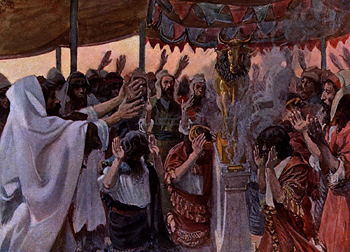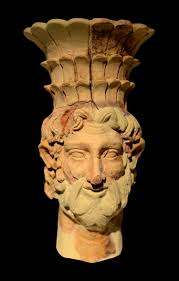
The Call Is Going Forth
A spiritual call is going forth across the planet to the people of Elohim—to those who look to the God of the Bible (YHVH Elohim) as their source of spiritual enlightenment and guidance. Our loving Father in heaven is urging his people to come out of spiritual Babylon. This plea and warning message is found in Revelation 18.
1 After these things I saw another angel coming down from heaven, having great authority, and the earth was illuminated with his glory.
2 And he cried mightily with a loud voice, saying, “Babylon the great is fallen, is fallen, and has become a dwelling place of demons, a prison for every foul spirit, and a cage for every unclean and hated bird!
3 “For all the nations have drunk of the wine of the wrath of her fornication, the kings of the earth have committed fornication with her, and the merchants of the earth have become rich through the abundance of her luxury.”
4 And I heard another voice from heaven saying, “Come out of her, my people, lest you share in her sins, and lest you receive of her plagues.
5 “For her sins have reached to heaven, and God has remembered her iniquities.
6 “Render to her just as she rendered to you, and repay her double according to her works; in the cup which she has mixed, mix double for her.
7 “In the measure that she glorified herself and lived luxuriously, in the same measure give her torment and sorrow; for she says in her heart, ‘I sit as queen, and am no widow, and will not see sorrow.’
8 “Therefore her plagues will come in one day–death and mourning and famine. And she will be utterly burned with fire, for strong is the Lord God who judges her. (Rev 18:1–8)

Babylon the Great is a worldwide economic, political and religious system whose tentacles literal reach into every aspect of every human endeavor going back for thousands of years. It’s a demonic system at whose heart is the spirit of rebellion against the laws of Elohim as revealed in the Bible. It seeks to draw humans into its sticky net through appealing to man’s base nature involving his lust for power, fame, possessions, wealth, antichrist spirituality and head knowledge. All this is in opposition to the truth of the Bible and to Yeshua the Messiah, who is the central figure of the Bible. It is a cosmic struggle between Elohim the Creator, the source of all good, versus Satan, a created being who is in total opposition to Elohim and who is the epitome of all evil. Man who is in the middle between the two has to choose who he will serve and follow. To not choose is by default to follow Satan. Babylon the Great is a poetic name for that end times worldwide system that stands in opposition to Elohim.
At this time, Elohim is calling his people out of the religious system of Babylon the Great in which they have unwittingly become entangled. We must first identify the problem and learn how it has ensnared us so that we will know what to come out of. It all starts when well-intentioned religious men start down a slippery slope called spiritual syncretism. This is what we want to discuss below.
Syncretism Defined
Syncretism is defined as “the amalgamation or attempted amalgamation of different religions, cultures, or schools of thought.” In a biblical context, it has to do with YHVH’s people mixing or combining the religious truths as given them by YHVH, the God of the Bible, with those of the surrounding pagan cultures to form a religious admixture. Scripture reveals this act as mixing the holy (set-apart) with profane (that which is polluted or defiled)—something which YHVH detests. When YHVH’s people do this, the Scriptures liken this to spiritual adultery or fornication. Unless YHVH’s people repent of adopting pagan customs and belief systems, YHVH promises judgement upon them.
Down through the ages from the birth of the nation of Israel in Egypt until the present time, YHVH’s people have had to fight hard to not be swept along by the currents of the cultures in which they find themselves. The history of the people of Elohim is a sad and repetitive story of YHVH revealing his truth to them, and their eventually abandoning it to one degree or another to curry the favor of the world. This process started long ago with ancient Israel.
Ancient Israel and Syncretism
The biblical record chronicles many examples of ancient Israel turning away (or apostatizing) from the truth of YHVH and adopting or syncretizing YHVH’s truth with the heathen practices of the nations around them. Here are a few of them.

- The golden calf incident in Exodus 32. While worshiping the golden calf, the Israelites proclaimed a feast to YHVH (verses 3–4).
- The incident where the Israelite men fornicated with the Moabite and Midianite women in Numbers 25:1–18 and 31:16 brought a curse upon Israel.
- Jeroboam when he led the ten tribes of the Northern Kingdom of Israel to turn from YHVH and to worship false gods (2 Kgs 17:7–23). The Babylonian church system continues to walk in the religious spirit of Jeroboam.
- Isa 1:13–14—Elohim says, your feasts, sabbaths and new moons he hates because their yours, not his.
- Mal 2:11—Not only Ephraim (the church) has mixed itself with the paganism of the world, but so has Judah. Judah has profaned YHVH’s holy institution, which YHVH loves, and Judah (rabbinic Judaism) has married the daughter of a foreign god.
Resisting Baal worship—the religion of the pagans of Canaan where the Israelites lived—was one perhaps the greatest challenge the Israelites faced.

Baal Worship in the Bible
Baal was a Caananite god whose worship was characterized by nature worship and forbidden sorcery, divination, lewd sexual practices and other abominable practices that YHVH detested. Baal, whose consort (his sister-wife) was Ashteroth, had divine similar counterparts in Egyptian, Babylonian, Greek and Roman pagan religious systems.
YHVH commanded his people to have nothing to do with the pagan gods of the nations around them including Baal. The Israelites were to serve and worship YHVH exclusively. Tolerance and inclusiveness of heathenism was forbidden. The Bible views all pagan religious systems as antithetical to the truth of the YHVH’s Word and forbids the Israelites from having any concourse whatsoever with these systems. Throughout the Bible, YHVH’s people continually toyed with the heathen gods and their religious systems. This practice brought them great trouble and judgment. They never achieved their full potential as a powerful spiritual light to the nations because of this tendency.
The Church Inherited the Spirit of Syncretism
- The lies of Jeroboam who turned away from YHVH’s Torah law and fused the worship of Elohim with that of the pagan religions around them have passed on down to the modern mainstream church. This syncretism comes in the form of either minimizing the value of YHVH’s Torah-law or all but rejecting by calling it “done away with,” “against us,” “nailed to cross,” “that old Jewish law” or by referring to it in some other derogatory term. This syncretism also manifests itself in the mixing of biblical truth with pagan traditions present in the Christian church’s non-biblical holidays.
- Our fathers have inherited lies (Jer 16:19). Both the Jews and Christians have stumbled over Yeshua (Isa 8:14). The former reject Yeshua as the Living Torah and Messiah, and the latter reject Yeshua as the Torah of Elohim incarnate by refusing to be Torah-obedient as he was.
- Yeshua came to restore the truth in the first century. The Jewish religious system rejected him and still does. Yeshua re-established the true religion of the Bible which was Torah-based. This religion was practiced by Yeshua’s disciples in the book of Acts. The church has largely rejected this and replaced much of the religion of Acts with the traditions of men—some of which have even been borrowed from the pagans.
- After the last apostle of Yeshua died at the end of the first century, the early church fathers of the second century went into apostasy as they largely rejected the Hebrew, Torah roots of the Christian faith. This is amply shown in the writings of the ante-Nicene church fathers.
Syncretism Crept Into the Early Church
Here is a partial list of the approximate time periods when several major unbiblical doctrines of men crept into the early church from the writings of the early church fathers. All of these church doctrines are a result of church leaders compromising the truth of the Bible and acquiescing to syncretizing with the pagan Roman spiritual and political culture of the day.
The Human Soul Is Immortal
- A.D. 130— The Epistle of Mathetes to Diognetus, ch. 6
- Ca. A.D. 155—The First Apology of Justin Martyr, ch. 18
- Ca. A.D. 180—Irenaeus’ Against Heresies, Book Two, ch. 34
- Ca. A.D. 180—Irenaeus’ Against Heresies, Book Five, chaps. 7.1; 31.1
Teachings Against the Sabbath and Biblical Feasts
- A.D. 130—The Epistle of Mathetes to Diognetus, ch. 4. The author calls the Sabbath and biblical feasts “utterly ridiculous and unworthy of notice.”
- Ca. A.D. 130—Epistle of Barnabas, ch. 2 (also ch. 14). The author says that the Sabbaths (that is, the weekly Sabbath and biblical feasts) are abolished.
- Early part of second century A.D.—Epistle of Ignatius to the Philippians, ch. 14
Observance of the Lord’s Day (Sunday) Advocated Over Sabbath Observance
- Early part of second century A.D.—Epistle of Ignatius to the Magnesian, ch. 9. The author says to keep the Sabbath on Sunday.
- Early part of second century A.D.—Epistle of Ignatius to the Trallians, ch. 9
- Ca. A.D. 130—Epistle of Barnabas, ch. 14
- Ca. A.D. 155—The First Apology of Justin Martyr, ch. 67
Teachings Against the Torah
- Early part of second century A.D.—Epistle of Ignatius to the Philadelphians, ch. 6. The author declare, “If anyone preach the Jewish law, listen not to him.”
- Early part of second century A.D.—Epistle of Ignatius to the Magnesian, ch. 10
- Ca. A.D. 155—The First Apology of Justin Martyr, ch. 47: The author states that out of “weak-mindedness,” some Christians observe the Mosaic law. Sabbath and feast days observance are optional, but not encouraged.
Anti-Semetic/Anti-Torah Theology
- Early part of second century A.D.—Epistle of Ignatius to the Magnesian, chaps. 8, 10
- Ca. A.D. 180—Irenaeus’ Against Heresies, Book Four, ch. 16.4. The author declares that the Decalogue was not cancelled by the New Covenant, but the statues and judgments of the Torah were a bondage to the Israelites and are no longer binding on Christians.
Teachings Against the Biblical Dietary Laws of Clean and Unclean Meats
- Early part of second century A.D.—Epistle of Ignatius to the Philadelphians, ch. 6. The author states that one who adheres the biblical dietary laws “has the apostate dragon dwelling within him.”
Easter Celebration Established a Christian Holiday
- Ca. A.D. 150—The celebration of the resurrection within the early church began in the middle of the second century (History of the Christian Church, vol. 2, pp. 207–8, by Philip Schaff). The date of Easter and its formal establishment and disconnection from Passover occurred in A.D. 325 at the council of Nicea.
Sabbath Officially Changed to Sunday
- A.D. 321—Sunday officially becomes the weekly day of worship (in place of the Sabbath) by a legal enactment of Emperor Constantine (History of the Christian Church, vol. 3, p. 378ff, by Philip Schaff; History of the Christianity, vol 1, p. 93, by Kenneth Scott Latourette)
Christmas Established as a Christian Holiday
- Ca. A.D. 154—Christmas originated in the middle the end of the fourth century as a Christian holiday as an outgrowth of a pagan festival celebrating the birth of the pagan sun-god.
The Heresies of Marcion
Examples of the influence of the early church father Marcion (ca. A.D. 130–150) upon modern Christianity:
- “Following the New Testament era, one of the first heresies that the church faced was propounded by Marcion…. About A.D. 138, Marcion began to argue that the Old Testament was inferior to the New and hence had no part of authoritative revelation. He therefore fought to have it removed from the canon. To some degree, Marcion appears to have been influenced by the dualistic teachings of Gnosticism. Thus he held that the world, with its appalling evils, was created by a Demi urge (a term Gnostics borrowed from Platonism). This cruel god of battles and bloody sacrifices, so Marcion contended, was revealed int he pages of the Old Testament. He insisted that since an evil world could not be created by a good God, the Old Testament was really the Demiurge’s book and hence of lesser status than the New. The Old was the great antithesis of the New and thus was deemed as being imperfect, offensive, and unedifying. In A.D. 144 the issue finally came to a head, and the church in Rome excommunicated Marcion. But the New Testament, Marcion insisted, revealed the true God in the coming of Christ from heaven. Unlike the Demiurge, this God was a God of love. Marcion argued that the New Testament, being Christ’s book (not that of the Demiurge), was unquestionably superior to the Old Testament. Furthermore, in his quest to demote the Old Testament from its recognized position of authority, he began to extol the writings of Paul, which held that Christians ‘were free from the law’ (cf. Gal 5:1). He contended that the church was wrong in attempting to combine the gospel with Judaism. Indeed, Marcion’s principal goal was to rid Christianity of every trace of Judaism. Hence, Marcion became known as the archenemy of the ‘Jew God.’ Though cunningly concealed, in today’s church rather strong vestiges of Marcionism have survived. But we are polite. Hardly aware of its subtle presence, we do not call it ‘Neo-Marcionism,’ ‘heresy,’ or ‘anti-Judaism.’ Nevertheless, in our concerted effort to be ‘New Testament’ believers, we have too often unconsciously minimized the place and importance of the Old Testament and the church’s Hebraic roots .… In addition to relegating the Old Testament to secondary importance in preaching and teaching, Neo-Marcionism continues to plague today’s church in other ways” (Our Father Abraham, by Marvin Wilson, pp. 109–110). Wilson then goes on to describe the concept of “replacement theology” that has been prevalent in the Christian church since its early history as well has the downplaying of the Jewishness of Yeshua and the early Messianic believers.
- David Stern in his Jewish New Testament Commentary reiterates the heresies of Marcion and explains how the heresies of Marcion have infiltrated the thinking of modern Christians (pp. 236, 345).
- “Often Romans 10:4 has been translated [in our English Bibles] improperly, ‘For Christ is the end of the law….’ The Greek word telos, which is translated as “end” in this verse, is better understood in its wider meaning, “goal” or “purpose.” Paul viewed the coming of the Messiah as the climax of salvation history. When the NIV, NASB, and KJV translate the Greek word telos with “end,” the result is devastating. Instead of stressing the crucial significance of reaching the ultimate goal of Torah, which is indeed foremost in Paul’s thought, Christians fall prey to Marcionism: the “end” of the law means license; the law has been canceled and has lost its practical application in living. (Paul the Jewish Theologian, by Brad Young, p. 31)
- “In [Romans 3:30], Paul stress that ‘God is one.’ In reality, Marcion was attacking the doctrine of God when he declared that the Jewish Bible was defunct. The foundation of Christian belief is based upon the Jewish concept of God as revealed in Torah. Our perspective of Torah will determine our faith in God. The difference between Jesus and Paul, on the one hand, and Marcion, on the other, may be summed up in one word—Torah …. Neither Jesus nor Paul were against Torah. They were not antinomians. Sadly, however, traditional Christian interpretations have been tainted by Marcion-like teachings that separate the message of Jesus from its rich Jewish heritage.” (ibid., p. 67)
More Examples of Syncretism in the Church
The gospel message of “repent, for the kingdom of heaven is at hand” is not being preached because it’s not politically correct to do so.
- The law was done away with
- Law vs. Grace
- God of the OT vs. Yeshua of the NT
- The substitution of YHVH’s biblical feasts for pagan-based holidays

Christmas (Saturnalia): mistletoe, greenery, lights, Santa Clause, wreath, Christmas tree
Easter (Ishtar)
Halloween
Lent
Valentines Day (Lupercalia)
- Several examples of Christian terminologies
holy, hallowed
church
amen
- Several examples of Christian doctrines

the immortality of the soul
going to heaven when you die
the doctrine of the trinity—the masculine gender of the Ruach
- Examples of Christian traditions that are pagan-based
steeples on churches
Christmas tree at the church altar
Mystery Babylon the Great

The end time outgrowth of that religious system that was opposed to the true religion of the Bible is referred in the book of Revelation as “Babylon the Great” in Revelation 18. In the end times (just prior to the return of Yeshua the Messiah, YHVH’s people are have mixed the truths of the Bible with the pagan beliefs and customs of the heathens around them. Spiritual Babylon is a worldwide system that has taken in all peoples and religions of the world has held them spiritually captive, or made them spiritually drunk on the wine of her false doctrines (Rev 18:3). YHVH urges his people to come out of Babylon (Rev 18:4), for he is about to bring judgment against Babylon and its worldwide Antichrist religious, political and economic system. From the fact YHVH is calling his people out of Babylon, we conclude, that the people of YHVH, who follow the Bible and worship the God of the Bible have adopted many pagan practices and combined or syncretized them with the truths of the Bible—something that YHVH finds unacceptable.
Babylon the Great traces its spiritual roots back to Satan (the serpent) at the tree of the knowledge of good and evil in the Book of Genesis. The word Babylon means “mixture” or “confusion.” It is a religious system comprised of both good and evil, truth and error (from a biblical perspective). As Satan, the serpent, tempted Adam and Eve to rebel or sin against YHVH Elohim (as recorded in Genesis 3), so Satan has used the false religious systems of Baal, Babylon and end time spiritual Babylon to subvert his people away from the truth of the Bible and to mix truth with error even as Adam and Eve did. YHVH is calling his people to come out of spiritual Babylon and to repent of pagan practices and to only follow biblical-based truths, practices, beliefs and lifestyles and to have no concourse with heathen practices.
A Call to Action: What Should Be the Response of YHVH’s People to Paganism?
Yeshua’s followers are to come out of Babylonian religious systems (Rev 18:4). Not everything in the modern, mainstream Christian church is bad. Spiritual Babylon is a mixture of good and evil—just like the tree of good and evil in the Garden of Eden. YHVH wants his people to leave behind the traditions of men that make the Word of Elohim of none effect. How do you know what is good? We must prove all things against the Scriptures and if it lines up with the Bible, then keep it, and if not, throw it away. Not everyone can hear this message. Some are sound asleep and totally comfortable in Babylon—in the arms of the whore religious system. Perhaps YHVH is not calling them out yet. Those who have ears to hear know this message is for them, and that it is time to come out.
There are many good things in the church. Let’s give credit where credit is due. But it is time for many saints to come out of the religious traditions of men and get back to the bedrock truth of the Bible—back to the ancient paths of the Scriptures, back to the Hebraic roots of the Christian faith. YHVH is looking for a bride that is without spot and wrinkle for Yeshua his Son. If you want to be that bride, then there are some things you need to understand and to do.
- The followers of Yeshua must own their spiritual identity as the sons of light (not darkness), as citizens of another kingdom, as pilgrims passing through to another world, as a peculiar people, a royal priesthood, as children of Elohim, as righteous and redeemed Israelites as opposed to heathen Gentiles.
- Yeshua called his disciples to be in the world, but not of the world (John 17:11,14).
- The saints are to be salt and light. This is not possible if we are undifferentiated from the world (Matt 5:13–14).
- The saints are to be set-apart, not profane (worldly, polluted or defiled by the pagan customs and traditions of this world, see Ezek 22:26; 44:23)
- A follower of Yeshua cannot be a friend of this world and a friend of Elohim at the same time (Jas 4:4).
- Yeshua’s disciples are to come out of the world and to be separate from the heathens (2 Cor 6:14–17).
- The people of YHVH are to be a set-apart (holy) people even as YHVH is set-apart (Lev 20:4; Heb 12:14).
- Redeemed believers are to let go of any and all traditions of men which violate or have superseded the Word of Elohim (Matt 15:7–9; Mark 7:7, 9).


Yes! Your email came in as we were finishing our fellowship to put the icing on the cake!
Our message from Elohim today was titled, “Who are you following?” Being separate and living the set apart life. 1 Cor. 11:1, 1 Cor. 4:6-21, Philippians 3:17-21, Luke 9:23 and
2 Timothy 3:1-5. I never get tired of knowing we are on the same page with the Ruach!
He pulled them out of Egypt-then had to get Egypt out of them before they could be filled with His Spirit. When hubby and I learned the truth, we were so very excited and couldn’t wait to get to church that Sabbath (SDA) to tell our church family( for 3 Sabbaths)-who promptly rejected it! We left to follow Him Who said “Follow Me.” what a blessing to be called out and to respond appropriately together! Onwards and upwards BLOG FAMILY 🙂
Amein!
‘Babylon the Great’ is just a great, big boys club, that is blind. They can hear the Truth, they can even touch and feel the Truth but they just can’t see it.
John